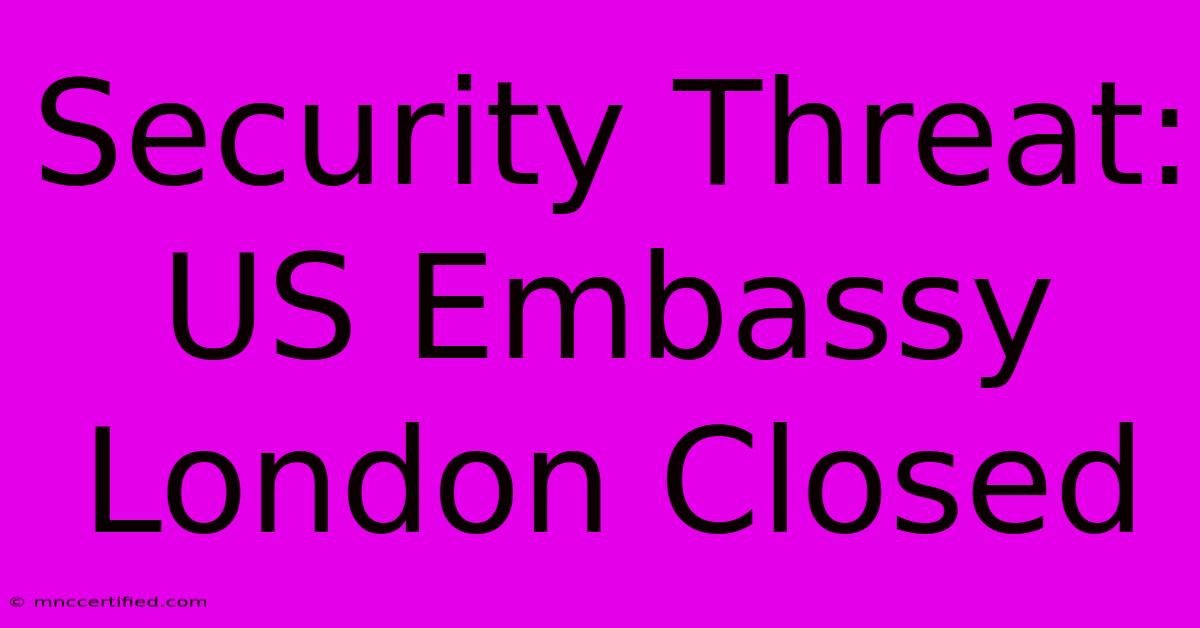Security Threat: US Embassy London Closed

Table of Contents
Security Threat: US Embassy London Closed - What We Know
The temporary closure of the US Embassy in London due to a security threat has sent ripples of concern across international relations and sparked widespread media coverage. This article will delve into the details surrounding this incident, exploring the potential threats, the embassy's response, and the broader implications. We'll also discuss how such events impact diplomatic relations and the security measures in place to protect diplomatic missions.
The Incident: A Security Threat Forces Closure
On [Insert Date of Closure – replace with actual date if known, otherwise remove sentence], the US Embassy in London announced its temporary closure citing a credible security threat. The announcement, issued via official channels and social media, urged all visitors and staff to avoid the area immediately. The exact nature of the threat remains undisclosed for security reasons, fueling speculation and heightening public anxiety. This secrecy is a standard practice in such situations to avoid compromising ongoing investigations and potentially alerting any perpetrators.
Speculation and Unconfirmed Reports
While official statements are limited, various news outlets have reported [mention any unconfirmed reports, if any, while emphasizing their unconfirmed nature. E.g., "unverified reports suggesting a potential bomb threat," or "speculation linking the closure to broader geopolitical tensions"]. It is crucial to rely on official sources for accurate information and avoid spreading misinformation. The lack of concrete details only intensifies public interest and fuels the need for credible, verified updates.
Embassy Response and Security Protocols
The US Embassy's swift and decisive closure demonstrates the effectiveness of its existing security protocols. Such protocols are vital in protecting personnel and maintaining the integrity of diplomatic operations. This closure showcases a proactive approach prioritizing safety over routine operations. The incident underscores the ever-present security challenges faced by diplomatic missions globally and the constant need for preparedness.
Impact on Diplomatic Relations
The closure of the US Embassy, even temporarily, sends a significant message. It underscores the seriousness of the threat and potentially impacts ongoing diplomatic efforts between the US and the UK. The disruption to normal operations can delay meetings, negotiations, and other critical diplomatic engagements. The incident serves as a reminder of the fragility of international security and the constant vigilance required to maintain stable relations.
The Broader Context: Global Security Challenges
This incident is not isolated. Embassies and diplomatic missions worldwide regularly face security threats ranging from cyberattacks to physical violence. These threats are often linked to broader geopolitical events, domestic instability, or the activities of extremist groups. The closure highlights the complex security landscape and the challenges faced by governments in protecting their diplomatic assets.
Moving Forward: Lessons Learned and Enhanced Security
This incident will undoubtedly prompt a review of security procedures, both at the US Embassy in London and at other diplomatic missions globally. Lessons learned will be crucial in enhancing security measures and ensuring the safety of personnel in the future. Increased intelligence sharing, advanced technology, and reinforced physical security are all potential areas of improvement.
Conclusion: Vigilance and Continued Monitoring
The temporary closure of the US Embassy in London due to a security threat underscores the ongoing importance of vigilance and proactive security measures in protecting diplomatic missions. While the specific details remain undisclosed, the incident serves as a stark reminder of the ever-present challenges in maintaining international security. Continued monitoring of the situation and reliance on official communication channels are crucial for accurate and timely updates. Further investigation will undoubtedly shed more light on the specifics of this security threat and its implications for future diplomatic practices.

Thank you for visiting our website wich cover about Security Threat: US Embassy London Closed. We hope the information provided has been useful to you. Feel free to contact us if you have any questions or need further assistance. See you next time and dont miss to bookmark.
Featured Posts
-
2024 Nba Lakers Vs Magic Odds Prediction
Nov 22, 2024
-
Get Oura Ring Gen3 For 249
Nov 22, 2024
-
Best Unis For Investment Banking
Nov 22, 2024
-
Iceland Seventh Volcanic Eruption
Nov 22, 2024
-
Vendor Single Interest Insurance
Nov 22, 2024